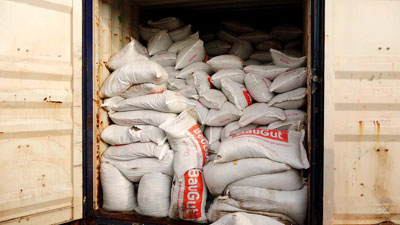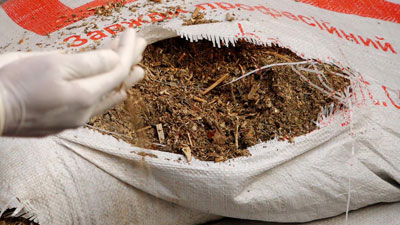News
Lost in transit?
Accusations are being levelled at different parties by the Sri Lanka Customs and local importers regarding the 28 containers of agricultural waste that were shipped to Sri Lanka as coriander.

Customs officials inspect the shipment
Sri Lanka Customs Superintendent, Ashraf Samusdeen told the Sunday Times that discrepancies seemed to arise on the part of multiple parties involved in the supposed coriander transaction. He noted that the import had not taken place directly between an exporter and an importer but had occurred through an intermediary. The exporter had been a party that was new to local traders, which Customs hold is one of the reasons the fraud was committed so easily.
The superintendent noted, however, that it was concerning that the shipment in question had received the Ukrainian Government’s phytosanitary certification, which confirms that the goods are free from disease or pests (insects), and that products have been prepared in such a way that they reach prescribed standards.
Allegations are also being levelled at Asha Shipping Pvt Ltd who have in turn claimed that it was a mistake that occurred as a result of forged Bills of Lading. ‘This is questionable since the documentation has received authentication from the banks as well,’ Mr Ashraf noted. He held that if they were forged, the shipping agent is not authorised to release the cargo to the importer.
Customs have mediated to expedite the repatriation of these containers and eight of them will be given their release orders within the next week.
Mr Samsudeen noted that the traders may have to engage in international arbitration since the consignment had been brought over on the delivery upon payment method which means that the funds had already been remitted to the Ukrainian Bank by the time the waste was discovered.
 The Sunday Times reached out to Asha Shipping Pvt Ltd who refused to comment on the grounds that it was an ongoing investigation.
The Sunday Times reached out to Asha Shipping Pvt Ltd who refused to comment on the grounds that it was an ongoing investigation.
The indenting agent, BV Global, responded to the Sunday Times communications. Representative of the company, Ganeshan Shabrinath clarified the events that took place subsequent to Dec 11, 2020. As the indenting agent of the transaction, BV Global was in direct communication with the Ukrainian Exporter Agronika Trade LLC. “BV Global organized the documentation for a shipment of coriander and the due processes were followed the same way we do for all the companies on our portfolio,” he said.
However, when the shipment arrived they were informed of a weight shortage by the consignee which was the first sign that something was wrong. A 40-ft container would usually carry cargo that weighed approximately 22 metric tonnes but this particular container only weighed 16 metric tonnes. At this juncture, the agent informed the Customs authorities and requested a check due to the duty refunds that would generally occur when the cargo weighs less than the amount paid for it. Accordingly, when authorities opened the container the following Saturday they discovered the agricultural waste inside. The supplier was immediately informed too and they too expressed confusion. Since the first shipment was not what it was supposed to be, the indenting agent asked for permission to check the cargo inside the South Asia Gateway Terminal so that it may be shipped back immediately if it was wrong. That is when the second load of agricultural waste was discovered. The whole consignment is currently being held by Customs.
Agronika claims that they too used a third party for the loading purpose because of resource deficits due to Covid. However, stakeholders are of the view that the Ukrainian company attempted to cheat the local traders. ‘If it was an administrative error as they claim, why haven’t they returned the importers’ money and where is the actual consignment of coriander that was supposed to come,’ asked the BVG representative.

Utter rubbish
The banks in Ukraine have currently frozen the funds that were deposited for Agronika by the Sri Lankan Traders and the stakeholders have requested help from the authorities to recover them. Should the recovery be unsuccessful, BVG will have to bear the cost of the consignment as per their responsibility as the indenting agent.
While suspicions had been directed at BVG by the authorities, the President of the Essential Food and Commodities’ Importers and Traders Association (EFCITA) G Rajendran told the Sunday Times that importers had been in business with the indenting agent company for a long time. Importers of the Association had been called in for the inquiry on Thursday this week and are due to go in for a second session next week. Importers are unable to reclaim their payments unless the exporter offers a letter releasing the funds to them.
While it was speculated that the local traders had orchestrated the situation, BVG assured that all local stakeholders were unaware, this was a view that was unofficially held by officials of the Sri Lanka Customs as well.
The waste was referred to the Plant Quarantine Department of the Central Environmental Authority upon discovery. They identified the contents of the container as ‘unidentified crushed plant materials.’ Reports from the Agricultural department had also confirmed that the consignment contained unidentified crushed plant chips and plant quarantine clearance could therefore not be granted due to the phytosanitary risk that existed. Secretary to the Ministry of Environment, Dr Anil Jasinghe had previously noted that a complaint would be lodged with the Basel Convention Secretariat located in Geneva as well. The convention that Sri Lanka is a signatory to prohibits the export of agricultural waste from one country to another.

